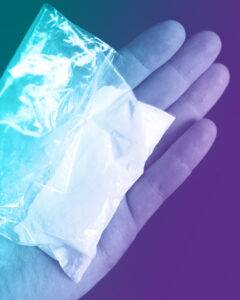What Is Coke Jaw
You have been using cocaine a lot since you enrolled in college. The surge of energy, the heightening of your senses, and the feelings of invincibility make you feel like never before. Sure, it can be expensive, but the feelings you get are worth it. It has even helped you stay awake during late-night cram sessions.

Lately, you have been feeling pain in your mouth. When you look in the mirror, your teeth seem to be noticeably different, stained with yellow and some black in areas. You wake up and feel pain in your jawline, as if you have been clenching it in your sleep. You decide to see a dentist, and he asks you if you use any illicit drugs. Why would he need to know? He informs you he is not here to arrest you, but that some substances, like cocaine, can cause teeth and jaw problems. There is even a term for it: coke jaw. You had no idea cocaine could cause these issues, but it all makes sense now.
In 2022, 143 non-fatal overdose ER visits in Florida were caused by stimulant use. Clean Recovery Centers understands how substance use affects all aspects of life, especially mental health. Our program has mental health components, and our team can diagnose and treat mental health conditions at any phase of treatment. When substances like cocaine begin taking a toll on your physical health, it can be concerning. Let’s talk about coke jaw, and how it can impact your daily living.
What Does Coke Jaw Consist Of?
Coke jaw is a slang term to describe a not-so-known side effect of cocaine use. Cocaine is a stimulant, meaning it causes a rush of energy and euphoria. This can increase behaviors associated with anxiety, such as grinding your teeth. Constantly grinding your teeth puts wear on the enamel causing damage to your teeth. It also causes pain in the jaw, where coke jaw gets its name.
Coke Jaw Signs and Symptoms
Visible signs of coke jaw include seeing the person move their jaw from side to side, typically in a clenched position. There may also be signs that muscles are twitching. Symptoms of coke jaw include:
- Chipped or broken teeth
- Pain in the jaw
- Tooth decay
- Bleeding gums
- Headaches
- Muscle spasms
Short and Long-Term Effects of Coke Jaw
Short-term, the effects of coke jaw may be minor. Clenching and grinding your teeth will cause discomfort, but the effects may not be noticed right away. Pain in the jaw and gum problems are often the first indicators the person is living with coke jaw.
Long-term, coke jaw can cause serious issues with the mouth. Bruxism is a condition that describes teeth clenching and grinding. If this is left untreated, the teeth will begin to change shape and length. The person is essentially filing their teeth away, causing sensitivity, pain, and poor chewing abilities. The teeth can become so damaged that they fall out altogether. Bruxism from cocaine use can become serious when paired with cocaine’s other side effects. The person often does not have an appetite, leading to malnourishment. Gum health deteriorates, causing teeth to fall out more easily.
Cocaine Use and the Impact on the Jaw, Mouth, and Teeth
 When people think of cocaine use, they often have a vision of the common side effects. Paranoia, crazy energy, and bouts of mood swings seem to come to mind first, followed by weight loss and nosebleeds. While these do occur in many cocaine use stories, there is more going on within the body. Cocaine causes changes in the way blood flows through the veins, resulting in restriction. Veins end up constricting, making the heart work harder to keep blood flowing properly. This constriction causes many health problems, especially in the jaw, mouth, and throat.
When people think of cocaine use, they often have a vision of the common side effects. Paranoia, crazy energy, and bouts of mood swings seem to come to mind first, followed by weight loss and nosebleeds. While these do occur in many cocaine use stories, there is more going on within the body. Cocaine causes changes in the way blood flows through the veins, resulting in restriction. Veins end up constricting, making the heart work harder to keep blood flowing properly. This constriction causes many health problems, especially in the jaw, mouth, and throat.
Dry Mouth
Our mouth is a balanced system that produces moisture to help regulate things like chewing and swallowing. Cocaine reduces saliva production, resulting in dry mouth. Dry mouth may seem to be not a big deal, but over time, chronic dryness can cause issues. These include gum disease, bleeding gums, and tooth decay. Those who use cocaine by rubbing it on the gums may experience faster gum deterioration.
Perforation of the Oral Palate
The word perforation means a hole made by boring or piercing. As we mentioned above, cocaine restricts blood flow, and when snorted, it causes reduced blood flow to the nasal cavity. This leads to damage to the tissue, resulting in necrosis. It is important to note that necrosis cannot be reversed. Once tissue dies, there is no way to replace it without medical intervention. As the nasal tissue dies, the roof of the mouth also deteriorates. This results in perforation of the oral palate, resulting in difficulties eating, speaking, and swallowing.
Dental Erosion
Erosion of the teeth is fairly common with cocaine use. Cocaine is acidic, similar to citrus juices or coffee. We have all seen the commercials for toothpaste that help reduce erosion from acidity. Cocaine causes similar effects, eroding the enamel of teeth. This makes them weak and more susceptible to damage. Teeth are similar to tissue, once damaged, medical intervention is usually needed to fix the problem. Tooth loss or decay can result in needing implants or dentures to be able to eat and speak again.
Temporomandibular Disorders (TMD)
Common symptoms of TMD include clenching the jaw and grinding the teeth but it also comes with headaches, joint pain, and noises when the jaw joint is moved. Chronic cocaine use has been linked with affecting the stomatognathic system, which involves the oral and craniofacial cavities. Clenching and teeth grinding were among the most prevalent symptoms. Mouth mobility was also affected by TMD, resulting in difficulties swallowing and talking.
Coke Jaw Treatment Options
Cocaine is a highly addictive substance that actually changes the reward system within the brain. Dopamine receptors are most affected by cocaine use, and prolonged use results in a longer timeframe to rebalance these receptors. Because of this, cocaine use symptoms can continue even after the person has stopped using. Jaw clenching and teeth grinding can continue for months after quitting cocaine. Seeing a dentist is the only option for treating teeth and jaw symptoms. Those who are finding it difficult to stop cocaine use should seek treatment at an addiction treatment center. These facilities are equipped with the tools and therapies needed to address addiction head-on and help you find your success in recovery. They can help refer you to a dentist who can help alleviate your symptoms within the jaw and also provide relief from constant clenching.
Getting Treatment for Cocaine Addiction in Hillsborough County, FL
Cocaine can wreak havoc on the body and cause a plethora of unwanted side effects. The good news is that treatment is available to help you take back your life and find recovery. Cocaine addiction treatment will help you address the root causes of your addiction, while skill-building and coping classes will arm you with the tools needed to continue with a successful recovery. No two addiction stories are the same, and finding what works for you will help you move forward with your life. It may seem impossible now, but cocaine does not have to hold you down forever. Take the first step today, and rediscover your passions through treatment.
If you or someone you love is showing signs of cocaine jaw, it is time to seek treatment. Clean Recovery Centers understands how cocaine can devastate lives, taking away the person you love. Each of our facilities has a certified rapid-resolution therapist on site to help discover the root causes of addiction and address unresolved trauma. With locations throughout the Suncoast, we are here and ready to help you today. Call us at (888) 330-2532 to schedule an appointment today.
Get clean. Live clean. Stay clean.


